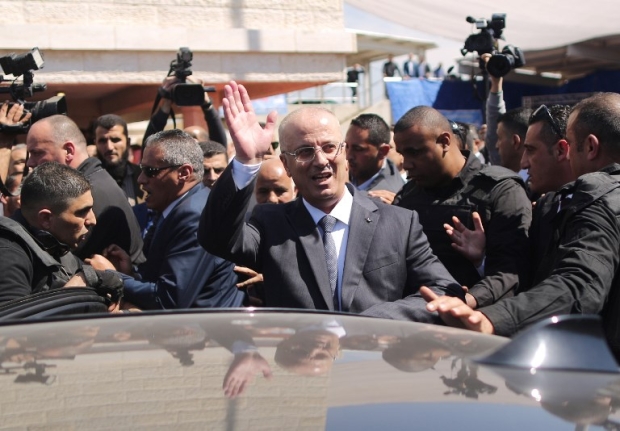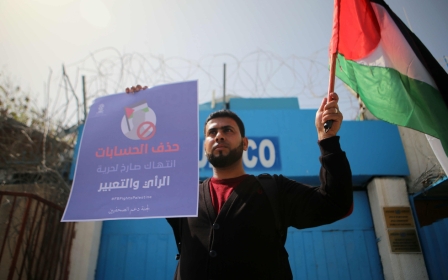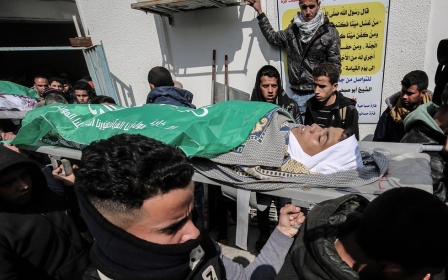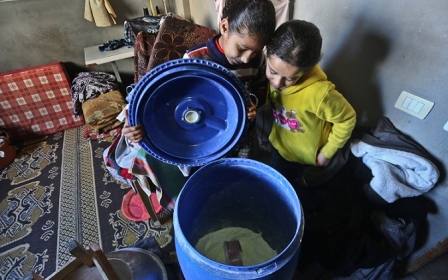Palestinian prime minister survives attack on convoy in Gaza
Palestinian Authority Prime Minister Rami Hamdallah and the PA's influential intelligence minister survived an apparent assassination attempt on Tuesday, as an explosion hit his convoy shortly after it had entered the Gaza Strip.
Neither Hamdallah nor Majid Faraj, the intelligence minister, were injured, security sources said, but seven people were wounded and several vehicles damaged.
A statement on official Palestinian media said PA President Mahmoud Abbas considered it a "cowardly targeting" of Hamdallah's convoy and held Hamas responsible for not providing adequate security.
Hamas has controlled Gaza since winning elections in 2006, driving out Abbas's Fatah party in fighting in 2007.
Both factions signed a Palestinian unity deal in October last year which was supposed to lead to the gradual transition of power back to the PA, but little progress has been made.
Hamas's spokesperson condemned the attack and rejected accusations from the PA that it held any responsibility.
Abbas's spokesman, Nabil Abu Rudeineh, said the attack on the consensus government was an attack on the unity of the Palestinian people, according to Palestinian news agency WAFA.
Fawzi Barhoum, Hamas's spokesperson, told Middle East Eye that "Hamas condemns the crime of attacking the convoy of Dr Rami Al-Hamdallah".
Hamas considers this crime as part and parcel of trying to destabilise the security in Gaza Strip and attacking reconciliation and solidarity
- Fawzi Barhoum, Hamas spokesperson
"Hamas considers this crime as part and parcel of trying to destabilise the security in Gaza Strip and attacking reconciliation and solidarity. The hands behind this crime are the same hands that killed Mazen Fuqaha, and tried to kill General Tawfiq Abu Naim."
Mazen Fuqaha was a commander of Hamas's military wing, and was killed last year in Gaza. Tawfiq Abu Naim, commander of Hamas's internal security forces in Gaza, survived an assassination attempt in October, after his car was blown up in the Nuseirat refugee camp in the middle of Gaza City. Hamas holds Israel responsible for both incidents.
Barhoum added that Hamas dislikes "the ready-made accusations" made by the PA officials in Ramallah against it, and asked the PA to open an investigation into the incident.
The PA's intelligence minister, Majid Faraj, who was travelling in the convoy with Hamdallah, told MEE: "This crime will not put us down in caring about the homeland. The attack is an attempt to blow up the unity of the homeland."
Faraj said that Abbas "insisted" that they remain in Gaza and carry on with their scheduled meetings.
He did not name any perpetrators, but he said that "those who have a presence on the ground have a responsibility to guarantee safety", referring indirectly to Hamas.
The explosion happened after Hamdallah's convoy passed through the Erez checkpoint from Israel near Beit Hanoun in northern Gaza.
Hamdallah travelled on to Gaza City, where he was met by Hamas security officials, according to AFP. He also attended the opening of a water treatment plant, part-funded by the PA, and the main purpose of his visit to Gaza.
Gaza's interior ministry spokesperson, Iyad al-Buzom, told Al Jazeera that pointing blame in the attack "has a political dimension".
"Here in Gaza we take all security precautions to welcome all the convoys and delegations and particularly the prime minister as he entered Gaza," he said.
An investigation into the incident had begun, he added.
Hamdallah was also due to meet with senior Hamas officials to discuss reconciliation talks between Hamas and the PA.
Leaders of both Fatah and Hamas hailed the unity deal signed in Cairo in October as an opportunity to end the decade-long rift between the rival Palestinian factions.
The deal saw the PA take over control of the Rafah border crossing between Gaza and Egypt, but other elements including the proposed deployment of 3,000 PA police officers in Gaza have yet to be fulfilled.
Palestinian political factions met again in November in the Egyptian capital, but reconciliation efforts have largely stalled since then.
Stay informed with MEE's newsletters
Sign up to get the latest alerts, insights and analysis, starting with Turkey Unpacked
Middle East Eye delivers independent and unrivalled coverage and analysis of the Middle East, North Africa and beyond. To learn more about republishing this content and the associated fees, please fill out this form. More about MEE can be found here.





